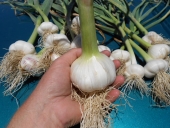
 6
6




 3
3




Invasive plants are Earth's way of insisting we notice her medicines. Stephen Herrod Buhner
Everyone learns what works by learning what doesn't work. Stephen Herrod Buhner
 3
3




Anne Miller wrote:I cant say that I have experienced both as I am in sunny Texas.
A homestead has more than just plants though being to have longer days to harvest is one benefit.
What about having to get out in 6 inches of snow to feed the animals?

 7
7




How Permies works: https://permies.com/wiki/34193/permies-works-links-threads
My projects on Skye: The tree field, Growing and landracing, perennial polycultures, "Don't dream it - be it! "
 4
4




Nancy Reading wrote:There are so many factors that affect the climate as well as the lattitude. I'm 57 degrees North here but in a mild maritime climate - so no penetrating frosts and rain anytime of year. I love the long days of summer when it never really gets dark, but we do different things in winter in long dark nights (!). Nothing grows much though between October and April, so we can harvest root crops and some perennial greens, but need to rely on storage for many fruit and vegetables.












 4
4




Dareios Alexandre wrote:I'm curious do you choose to live there or would you live elsewhere if you had the choice.

How Permies works: https://permies.com/wiki/34193/permies-works-links-threads
My projects on Skye: The tree field, Growing and landracing, perennial polycultures, "Don't dream it - be it! "
 4
4




Celtic/fantasy/folk/shanty singing at Renaissance faires, fantasy festivals, and other events in OR and WA, USA.
RionaTheSinger on youtube.
Pop-up garden/vintage+ yard stand owner.
 1
1




Riona Abhainn wrote:Pro for warmer winters = more of a growing season. Con of warmer winters = the bugs don't always properly die off the way they do in places with colder winters.
 1
1




Nancy Reading wrote:Yes, I gather our climate is pretty similar to parts of the PNW.
Dareios Alexandre wrote:I'm curious do you choose to live there or would you live elsewhere if you had the choice.
We're mostly here for financial reasons. Land, even poor arable land is pretty expensive in the UK if you want to live on it. And we love the Scottish Highlands - clean air and dark skies, distractingly beautiful. I like to live near the sea too.
I always think 'be careful what you wish for' - I might wish for a very little more warmth in summer, but then our soil is so shallow that it wouldn't take much for us to go into drought. Our winters are so mild that many mediterranean plants are quite happy here (given a well drained spot!). There are other aspects that suit me, like lack of streetlights and quiet roads (relatively speaking) so no, I wouldn't want to move
 4
4




--
"Whitewashed Hope: A Message from 10+ Indigenous Leaders and Organizations"
https://www.culturalsurvival.org/news/whitewashed-hope-message-10-indigenous-leaders-and-organizations
 2
2




John Daley Bendigo, Australia The Enemy of progress is the hope of a perfect plan
Benefits of rainfall collection https://permies.com/t/88043/benefits-rainfall-collection
GOOD DEBT/ BAD DEBT https://permies.com/t/179218/mortgages-good-debt-bad-debt

 3
3




Only if you like to ride - But driving may be an issue if you are not used to the conditions.John C Daley wrote:I think you have forgotten the important measure.
What is it like for riding motorcycles on the road!!
Everything else is really unimportant.
Failure is a sign of activity and learning. It had nothing to do with under achievement
I never want to have a team member who has never failed - They are not doing!! 👍

 4
4




Dareios Alexandre wrote:Most people assume that the warmer the climate, the easier and better it is for growing lots of produce. But colder climates have some benefits too. For people who have experienced both, what are the pros and cons of each in your opinion and which one would you choose?
 7
7




 5
5





 6
6




Some places need to be wild





